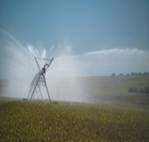 |
 |
  |

FUELS ||||| PROPANE ||||| LUBRICANTS ||||| FLEET FUELING ||||| CONTACT US
PROPANE IN AGRICULTURE
Residential • Commercial • Agricultural • Forklifts • Motor Fuel
Using Propane has may agricultural uses and advantages
because it is cost efficient, energy efficient, reliable and clean burning.
Almost 80 percent of farms in the U.S. use propane for flame weeding,
pest control, crop drying, irrigation pumps, poultry and pig brooding,
crop heating, power generation and tractor fuel.
Flame Weeding provides higher yields per acre when using propane gas
flame weeders.
Today many farmers are seeking alternatives to conventional pesticides
and herbicides as the costs of chemicals increase. Propane flamers can
cost up to five times less per acre than chemical controls.
Propane drying systems used for crop drying reduce equipment, fuel and
maintenance costs.
Propane fueled irrigation pumps produce the equivalent amount of power
as gasoline and diesel engines but have lower emissions and leave no
toxic residues.
Infared propane brooders are used for poultry and pig brooding because
they are more efficient and stay warmer with less heat than forced-air
furnaces. Fuel costs for propane brooders can be up to 25 percent less
than fuel costs for forced-air furnaces.
Propane heaters can be used for long periods of time and produce enough
heat to save valuable crops from being ruined in an unexpected cold spell.
Propane heaters are also used in many greenhouses.
 There are many benefits of using propane motor fuel in tractors. Costs
of maintenance can be much lower than gasoline or diesel powered tractors
and engine life may be extended. Because propane has a much higher octane
rate than gasoline, farmers may be able to pull larger equipment with
properly modified engines that have been converted to propane.
There are many benefits of using propane motor fuel in tractors. Costs
of maintenance can be much lower than gasoline or diesel powered tractors
and engine life may be extended. Because propane has a much higher octane
rate than gasoline, farmers may be able to pull larger equipment with
properly modified engines that have been converted to propane.
When it comes to alternative fuels, propane is the most portable. Storage
tank placement can be selected for accessibility and specific needs.
It can also be stored safely in portable tanks for convenience in the
most equipment in the most remote areas of the farm.
Propane is one of the safest fuels for farmers because it is nontoxic
and insoluble in water. There is no threat to aquifers or ground water
supply and it quickly vaporizes within a pressured container to be released
as a gas, thus eliminating spill, pool or residue.
© Haigood & Campbell, LLC